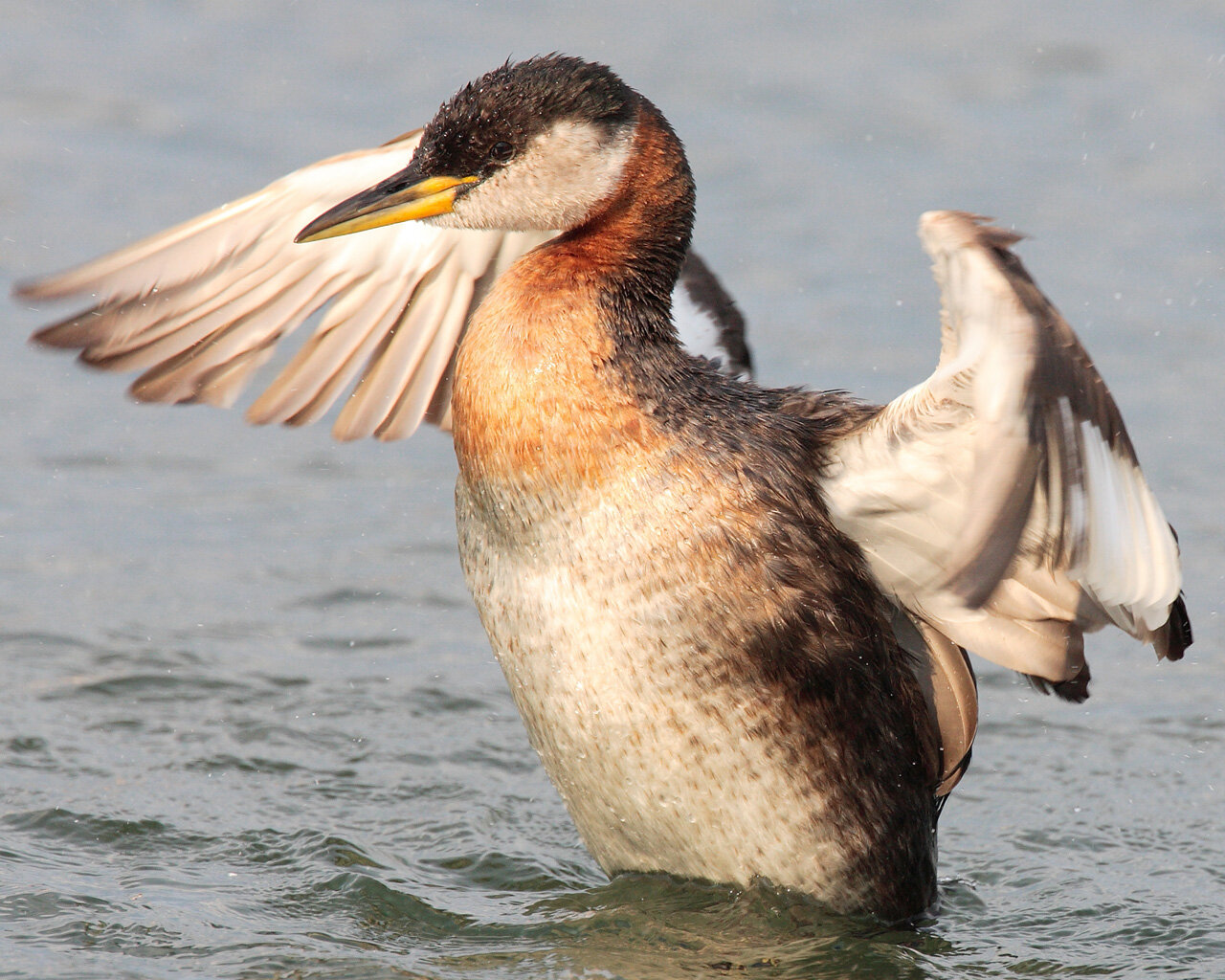
Birds of Pigeon Lake
Pigeon Lake is home to a diversity of birds including waterfowl, shorebirds and songbirds. These birds use the lake and the surrounding habitat as a stop-over during migration, nesting site, and in some cases, year-long residence. Not only are birds crucial to the healthy functioning of the Pigeon Lake ecosystem, they also contribute to the enjoyment and beauty of the lake and attract tourism and economic revenue.
Identification
Over 147 species of birds have been identified at Pigeon Lake, ranging from the tiny Ruby-crowned Kinglet to the large Great Blue Heron. Here we’ve included a sample of some of the common bird species that you can spot at the Lake.
Waterbirds
Canada Goose - Migratory
Canada Geese diets consist of vegetation such as grass. True romantics in the bird world, Canada Geese pairs stay coupled for life.
Red-necked Grebe - Migratory
Easy to identify by their “red necks” and dark crown plumage, Red-necked Grebes are a common sight at Pigeon Lake. Look for these grebes carrying their chicks on their backs.
Common Goldeneye - Resident
Common Goldeneye are resident birds, meaning that they can be found all year. Notice that the male and female have strikingly different colourations.
American Coot - Migratory
American Coots may look like an average waterbird, but under the water they are hiding a secret! Unlike the webbed feet you’d expect, these birds are famous for their green, lobed toes.
More Waterbirds
Double-crested Cormorant - Migratory
A visually striking bird, the Double-crested Cormorant can be easily spotted with its orange bill and blue eyes. Their diet consists mainly of fish, which they dive to catch.
Ring-billed Gull - Migratory
Ring-billed Gulls are a common sight at Pigeon Lake and throughout Alberta. Truly adaptive, these gulls can live in many habitat types and are omnivorous.
Killdeer - Migratory
Named because of their “kill deer!” call, these small shorebirds are brave defenders of their nests. Pretending to be injured, they will cause a distraction to avoid detection of the nest.
Great Blue Heron - Migratory
A truly “great” sized bird, Great Blue Herons can reach over 1 m in height. Their dagger-like bill is perfect for catching fish and other critters.
Songbirds and Others
Purple Martin - Migratory
Purple Martins are a welcome sight for many, occupying multi-chambered birdhouses and emitting a delightful metallic chirp. Known as “aerial insectivores” they catch their insects in-flight.
Cedar Waxwing - Migratory
For anyone with fruit-bearing shrubs or trees, the Cedar Waxwing is surely a common visitor. These sleek looking birds often travel in large flocks, emitting a high-pitched trill.
Yellow-bellied Sapsucker - Migratory
Yellow-bellied Sapsuckers are not always viewed as welcome guests by many; however, the neatly organized sapwells they drill in trees are food sources for many other animals such as bats and hummingbirds.
Yellow Warbler - Migratory
The Yellow Warbler is a truly colourful edition to the Pigeon Lake area. Both the male and female of this insectivorous species are a solid yellow color (occasionally with red streaks).
Family Fun Bird Activities
Tools for Birders
Records of Sightings in Your Area
eBird | iNaturalist
Song Identification
Dendroica | Song Sleuth
Identification and Life History
Apps
Merlin Bird ID | Raptor ID | Audubon Bird Guide: North America
Websites
Cornell Lab of Ornithology - All About Birds
Books
Birds of Alberta | Peterson (North America) | Sibley (North America)
Birdhouses
PLWA Birdhouse Guide
Cornell Lab of Ornithology - All About Birdhouses
References & Photo Credits
Identification
Species Count
https://ebird.org/hotspot/L2523394
Identification & Life History
https://www.allaboutbirds.org/news/
https://www.hww.ca/en/
Tools for Birders
Apps List
https://www.birdsandblooms.com/birding/birding-basics/5-birding-apps/
Reduce Window Collisions
University of Alberta
http://birdswindows.biology.ualberta.ca/you-can-help/
Homes Safe for Birds
https://birdsafe.ca/homes-safe-for-birds/
Best Practices
https://safewings.ca/strategies/best-practices/
Conservation Tips
Predation by Cats
https://catsandbirds.ca/take-action/
Creating a Bird Friendly Lot
https://www.audubon.org/news/how-make-your-yard-bird-friendly-0
https://www.nwf.org/-/media/PDFs/Garden-for-Wildlife/Gardening-Tips/Bird-Friendly_web
Images
Common Goldeneye photograph by Dick Daniels, distributed under CC BY-SA 3.0 license.
Red-necked Grebe photograph by Mdf, distributed under CC BY-SA 3.0 license.
American Coot photograph by Lip Kee Yap, distributed under CC BY-SA 2.0 license.
Great Blue Heron photograph by Frank Schulenburg, distributed under CC BY-SA 3.0 license..
Killdeer photograph by VJ Anderson, distributed under CC BY-SA 4.0 license.
Ring-billed Gull photograph by Mdf, distributed under CC BY-SA 3.0 license.
Double-crested Cormorant photograph by Dori, distributed under CC BY-SA 3.0 license.
Purple Martin photograph by VJ Anderson, distributed under CC BY-SA 4.0 license.
Yellow-bellied Sapsucker photograph by Charles J Sharp, distributed under CC BY-SA 4.0 license.
Cedar Waxwing photograph by Hans-Jorg Hellwig, distributed under CC BY-SA 3.0 license.
Yellow Warbler photograph by Mykola Swarnyk, distributed under CC BY-SA 3.0 license.















